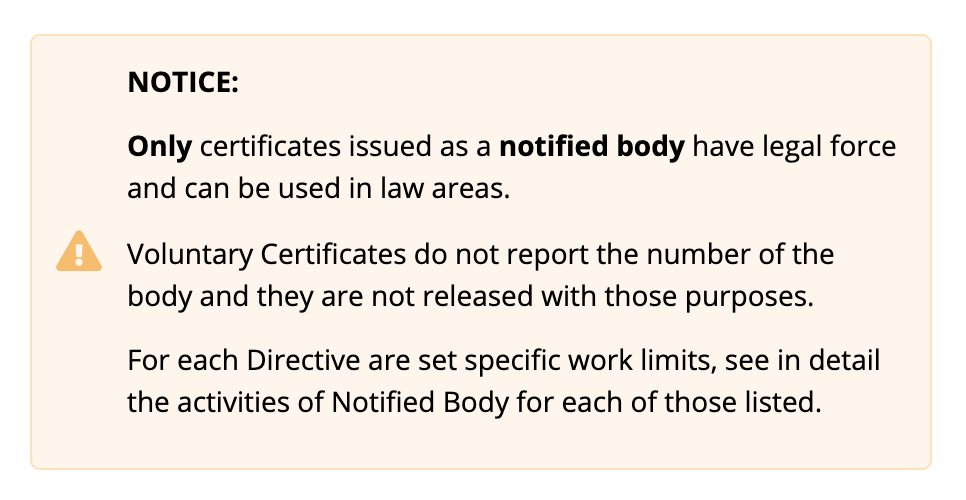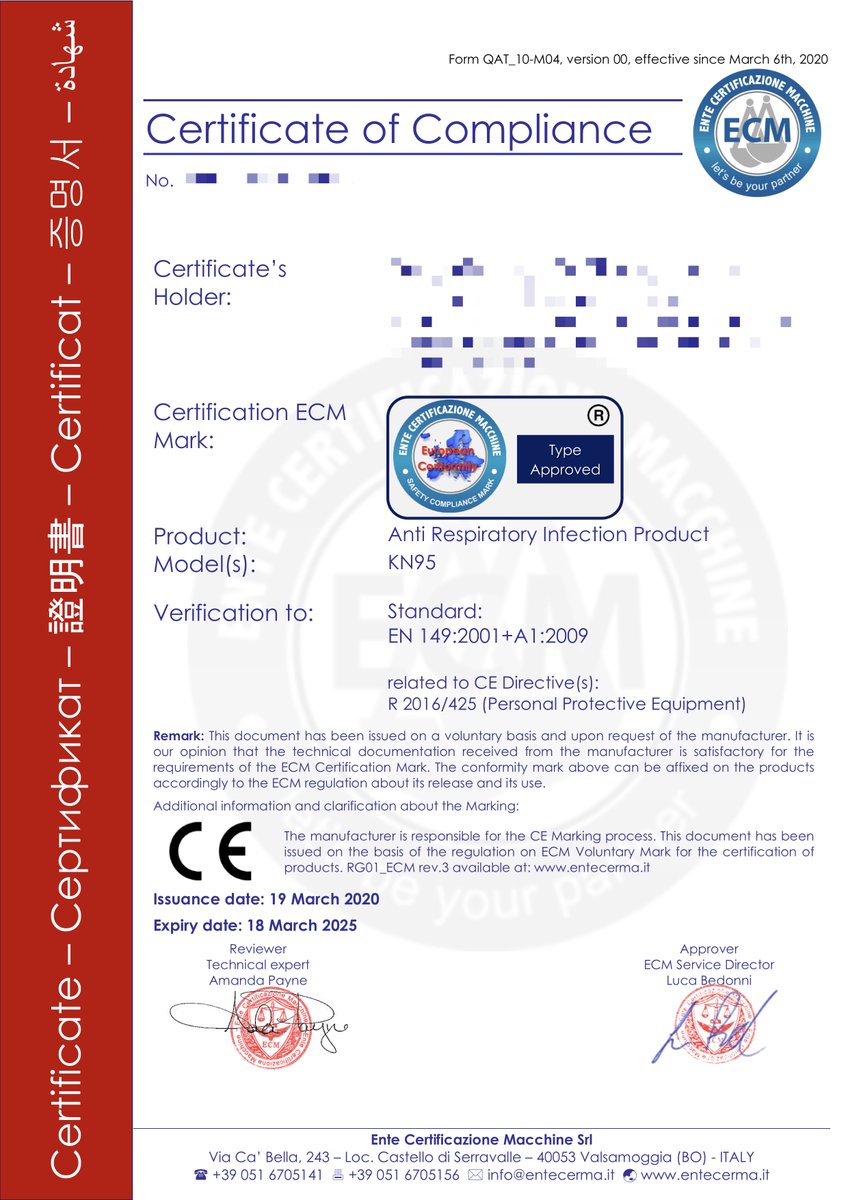A week ago, I joined a group of volunteers to help source and ship medical supplies from China to Europe so our frontline staff has everything they need to fight the coronavirus.
My work has mainly focused on verifying product certifications and I HAVE THOUGHTS ABOUT THIS https://abs.twimg.com/emoji/v2/... draggable="false" alt="👇" title="Down pointing backhand index" aria-label="Emoji: Down pointing backhand index">
https://abs.twimg.com/emoji/v2/... draggable="false" alt="👇" title="Down pointing backhand index" aria-label="Emoji: Down pointing backhand index"> https://abs.twimg.com/emoji/v2/... draggable="false" alt="🧵" title="Thread" aria-label="Emoji: Thread">
https://abs.twimg.com/emoji/v2/... draggable="false" alt="🧵" title="Thread" aria-label="Emoji: Thread">
My work has mainly focused on verifying product certifications and I HAVE THOUGHTS ABOUT THIS
Most governments ensure that imported goods meet their required safety rules through developing standards, requiring manufactures to hire certification organizations to verify their work, and providing a mechanism for validating these certificates.
A strong certification system removes many blockers for (international) trade, as it brings trust into a free market which can’t always rely on reputation.
It reduces the risk that you are buying a faulty product.
This is especially needed during a crisis.
It reduces the risk that you are buying a faulty product.
This is especially needed during a crisis.
For most medical equipment, these types of certifications are required. In the European Union, this is done through the CE certification process.
Here is how certificate validation works:
 https://abs.twimg.com/emoji/v2/... draggable="false" alt="🔍" title="Left-pointing magnifying glass" aria-label="Emoji: Left-pointing magnifying glass"> Find a supplier
https://abs.twimg.com/emoji/v2/... draggable="false" alt="🔍" title="Left-pointing magnifying glass" aria-label="Emoji: Left-pointing magnifying glass"> Find a supplier
 https://abs.twimg.com/emoji/v2/... draggable="false" alt="📋" title="Clipboard" aria-label="Emoji: Clipboard"> Get their certificate
https://abs.twimg.com/emoji/v2/... draggable="false" alt="📋" title="Clipboard" aria-label="Emoji: Clipboard"> Get their certificate
 https://abs.twimg.com/emoji/v2/... draggable="false" alt="🕵️♀️" title="Woman detective" aria-label="Emoji: Woman detective"> Figure out who issued it
https://abs.twimg.com/emoji/v2/... draggable="false" alt="🕵️♀️" title="Woman detective" aria-label="Emoji: Woman detective"> Figure out who issued it
 https://abs.twimg.com/emoji/v2/... draggable="false" alt="🖥" title="Desktop computer" aria-label="Emoji: Desktop computer"> Use the certifier’s website to validate it
https://abs.twimg.com/emoji/v2/... draggable="false" alt="🖥" title="Desktop computer" aria-label="Emoji: Desktop computer"> Use the certifier’s website to validate it
 https://abs.twimg.com/emoji/v2/... draggable="false" alt="🇪🇺" title="Flag of European Union" aria-label="Emoji: Flag of European Union"> Verify the certifier in the Nando database
https://abs.twimg.com/emoji/v2/... draggable="false" alt="🇪🇺" title="Flag of European Union" aria-label="Emoji: Flag of European Union"> Verify the certifier in the Nando database
This process works, but it could be much better
This process works, but it could be much better
While it’s amazing that the European Union has defined all these standards and requires a certification process, it failed to standardize the certificates themselves nor the verification process.
Each certificate looks different:
 https://abs.twimg.com/emoji/v2/... draggable="false" alt="🔒" title="Lock" aria-label="Emoji: Lock"> Few have security features
https://abs.twimg.com/emoji/v2/... draggable="false" alt="🔒" title="Lock" aria-label="Emoji: Lock"> Few have security features
 https://abs.twimg.com/emoji/v2/... draggable="false" alt="👩⚖️" title="Woman judge" aria-label="Emoji: Woman judge"> Some don’t list the certifier’s legal entity
https://abs.twimg.com/emoji/v2/... draggable="false" alt="👩⚖️" title="Woman judge" aria-label="Emoji: Woman judge"> Some don’t list the certifier’s legal entity
 https://abs.twimg.com/emoji/v2/... draggable="false" alt="🖥️" title="Desktop computer" aria-label="Emoji: Desktop computer"> Some don’t list the certifier’s website
https://abs.twimg.com/emoji/v2/... draggable="false" alt="🖥️" title="Desktop computer" aria-label="Emoji: Desktop computer"> Some don’t list the certifier’s website
 https://abs.twimg.com/emoji/v2/... draggable="false" alt="😖" title="Confounded face" aria-label="Emoji: Confounded face"> Each certifier’s website works differently
https://abs.twimg.com/emoji/v2/... draggable="false" alt="😖" title="Confounded face" aria-label="Emoji: Confounded face"> Each certifier’s website works differently
 https://abs.twimg.com/emoji/v2/... draggable="false" alt="🇪🇺" title="Flag of European Union" aria-label="Emoji: Flag of European Union"> Few certificates list their Nando number
https://abs.twimg.com/emoji/v2/... draggable="false" alt="🇪🇺" title="Flag of European Union" aria-label="Emoji: Flag of European Union"> Few certificates list their Nando number
It makes the process slow
It makes the process slow
The easy fix is for the EU to standardize the minimum set of information and a layout it should be presented in.
All certificates should have:
 https://abs.twimg.com/emoji/v2/... draggable="false" alt="📜" title="Scroll" aria-label="Emoji: Scroll"> Link (and QR code) to the certifier’s copy of the certificate
https://abs.twimg.com/emoji/v2/... draggable="false" alt="📜" title="Scroll" aria-label="Emoji: Scroll"> Link (and QR code) to the certifier’s copy of the certificate
 https://abs.twimg.com/emoji/v2/... draggable="false" alt="🇪🇺" title="Flag of European Union" aria-label="Emoji: Flag of European Union"> Link (and QR code) to the Nando listing
https://abs.twimg.com/emoji/v2/... draggable="false" alt="🇪🇺" title="Flag of European Union" aria-label="Emoji: Flag of European Union"> Link (and QR code) to the Nando listing
All certificates should have:
The long term fix would be to centralize not only the certification organization listings, but also the certificates themselves.
Why do buyers need to hunt down individual certificates across different databases if Nando could just serve all of them?
Why do buyers need to hunt down individual certificates across different databases if Nando could just serve all of them?
In the grand scheme of things, this is an incredibly minor inconvenience and I’m happy that doing this work is contributing in a small way to reducing the pain of this pandemic  https://abs.twimg.com/emoji/v2/... draggable="false" alt="🦠" title="Microbe" aria-label="Emoji: Microbe">
https://abs.twimg.com/emoji/v2/... draggable="false" alt="🦠" title="Microbe" aria-label="Emoji: Microbe">
I hope that we as a society learn from this crisis in many ways and perhaps streamlining the certification validation process could be one of the small things we improve  https://abs.twimg.com/emoji/v2/... draggable="false" alt="✨" title="Sparkles" aria-label="Emoji: Sparkles">
https://abs.twimg.com/emoji/v2/... draggable="false" alt="✨" title="Sparkles" aria-label="Emoji: Sparkles">
To give you an idea:
Validating a certificate can take ~30 minutes if you are having a hard time locating the certifier’s website and navigating it in a foreign language, whereas this really should be 5 minutes of work.
 https://abs.twimg.com/emoji/v2/... draggable="false" alt="📉" title="Chart with downwards trend" aria-label="Emoji: Chart with downwards trend"> 8 hours / 30 minutes = 16
https://abs.twimg.com/emoji/v2/... draggable="false" alt="📉" title="Chart with downwards trend" aria-label="Emoji: Chart with downwards trend"> 8 hours / 30 minutes = 16
 https://abs.twimg.com/emoji/v2/... draggable="false" alt="📈" title="Chart with upwards trend" aria-label="Emoji: Chart with upwards trend"> 8 hours / 5 minutes = 96
https://abs.twimg.com/emoji/v2/... draggable="false" alt="📈" title="Chart with upwards trend" aria-label="Emoji: Chart with upwards trend"> 8 hours / 5 minutes = 96
Validating a certificate can take ~30 minutes if you are having a hard time locating the certifier’s website and navigating it in a foreign language, whereas this really should be 5 minutes of work.
Here’s an example:
We found a new supplier with a seemingly legitimate certificate from a supposedly UK-based certifier.
 https://abs.twimg.com/emoji/v2/... draggable="false" alt="🇪🇺" title="Flag of European Union" aria-label="Emoji: Flag of European Union"> Certifier doesn’t show in Nando → Hard no
https://abs.twimg.com/emoji/v2/... draggable="false" alt="🇪🇺" title="Flag of European Union" aria-label="Emoji: Flag of European Union"> Certifier doesn’t show in Nando → Hard no
 https://abs.twimg.com/emoji/v2/... draggable="false" alt="✉️" title="Envelope" aria-label="Emoji: Envelope"> Email certifier to double check → Bounced
https://abs.twimg.com/emoji/v2/... draggable="false" alt="✉️" title="Envelope" aria-label="Emoji: Envelope"> Email certifier to double check → Bounced
 https://abs.twimg.com/emoji/v2/... draggable="false" alt="🇨🇳" title="Flag of China" aria-label="Emoji: Flag of China"> Domain registered from China
https://abs.twimg.com/emoji/v2/... draggable="false" alt="🇨🇳" title="Flag of China" aria-label="Emoji: Flag of China"> Domain registered from China
 https://abs.twimg.com/emoji/v2/... draggable="false" alt="📡" title="Satellite antenna" aria-label="Emoji: Satellite antenna"> Server configured in Chinese
https://abs.twimg.com/emoji/v2/... draggable="false" alt="📡" title="Satellite antenna" aria-label="Emoji: Satellite antenna"> Server configured in Chinese
We found a new supplier with a seemingly legitimate certificate from a supposedly UK-based certifier.
Round 2 of this certification thread:
Get ready to discuss how legitimate European certifiers also issue fake certificates https://abs.twimg.com/emoji/v2/... draggable="false" alt="🤯" title="Exploding head" aria-label="Emoji: Exploding head">
https://abs.twimg.com/emoji/v2/... draggable="false" alt="🤯" title="Exploding head" aria-label="Emoji: Exploding head">
And yes, I’ll be NAMING and SHAMING some of these companies because they are putting the health of people at risk in times of crisis https://abs.twimg.com/emoji/v2/... draggable="false" alt="🙅♂️" title="Man gesturing not ok" aria-label="Emoji: Man gesturing not ok">
https://abs.twimg.com/emoji/v2/... draggable="false" alt="🙅♂️" title="Man gesturing not ok" aria-label="Emoji: Man gesturing not ok">
Get ready to discuss how legitimate European certifiers also issue fake certificates
And yes, I’ll be NAMING and SHAMING some of these companies because they are putting the health of people at risk in times of crisis
After verifying dozens of potential Chinese manufacturing leads for medical supplies, I noticed that 3 certification companies tended to show up much more frequently than others.
These are Ente Certificazione Macchine (Italy), ICR Polska (Poland), and Celab (Italy).
These are Ente Certificazione Macchine (Italy), ICR Polska (Poland), and Celab (Italy).
I first noticed this when we started receiving Celab’s fake certificates for medical supplies, which made no sense to me because they are only accredited to complete “electromagnetic compatibility” certification
https://ec.europa.eu/growth/tools-databases/nando/index.cfm?fuseaction=search.nb&refe_cd=NANDO%5FINPUT%5F124828">https://ec.europa.eu/growth/to...
https://ec.europa.eu/growth/tools-databases/nando/index.cfm?fuseaction=search.nb&refe_cd=NANDO%5FINPUT%5F124828">https://ec.europa.eu/growth/to...
We then received ICR Polska certificates from potential suppliers, which was confusing because they are accredited for certifying “protective systems intended for use in potentially explosive atmospheres” which sounds like masks but isn’t
https://ec.europa.eu/growth/tools-databases/nando/index.cfm?fuseaction=search.nb&refe_cd=NANDO%5FINPUT%5F233263">https://ec.europa.eu/growth/to...
https://ec.europa.eu/growth/tools-databases/nando/index.cfm?fuseaction=search.nb&refe_cd=NANDO%5FINPUT%5F233263">https://ec.europa.eu/growth/to...
And eventually we got loads of fake certificates by Ente Certificazione Macchine, which was very disconcerting because they are even accredited to certify “medical devices” but that still does not cover “personal protective equipment”
https://ec.europa.eu/growth/tools-databases/nando/index.cfm?fuseaction=search.nb&refe_cd=EPOS%5F50158">https://ec.europa.eu/growth/to...
https://ec.europa.eu/growth/tools-databases/nando/index.cfm?fuseaction=search.nb&refe_cd=EPOS%5F50158">https://ec.europa.eu/growth/to...
Personal protective equipment, like masks, is required to be CE certified before it can be sold on the European market — as it should be! Faulty products can kill you.
All of these products have to adhere to “Regulation (EU) 2016/425” https://ec.europa.eu/growth/sectors/mechanical-engineering/personal-protective-equipment_en">https://ec.europa.eu/growth/se...
All of these products have to adhere to “Regulation (EU) 2016/425” https://ec.europa.eu/growth/sectors/mechanical-engineering/personal-protective-equipment_en">https://ec.europa.eu/growth/se...
The Nando database helpful lists which EU-based certification organizations are accredited for certifying products under “Regulation (EU) 2016/425” and you will see that ECM, ICR and Celab are not on it.
https://ec.europa.eu/growth/tools-databases/nando/index.cfm?fuseaction=directive.notifiedbody&dir_id=155501">https://ec.europa.eu/growth/to...
https://ec.europa.eu/growth/tools-databases/nando/index.cfm?fuseaction=directive.notifiedbody&dir_id=155501">https://ec.europa.eu/growth/to...
And then a couple of days ago, ICR Polska all of the sudden put a warning message on top of all their webpages saying that “assessments carried out so far are of a voluntary nature” and “these certificates do not confirm conformity.”
It seems like something spooked them.
It seems like something spooked them.
So I started digging into what ICR meant by “voluntary nature” and I can tell you now:
It’s not pretty.
It’s not pretty.
Turns out these companies have two business lines:
 https://abs.twimg.com/emoji/v2/... draggable="false" alt="👨⚖️" title="Man judge" aria-label="Emoji: Man judge"> Actual regulatory certification
https://abs.twimg.com/emoji/v2/... draggable="false" alt="👨⚖️" title="Man judge" aria-label="Emoji: Man judge"> Actual regulatory certification
 https://abs.twimg.com/emoji/v2/... draggable="false" alt="🤬" title="Face with symbols over mouth" aria-label="Emoji: Face with symbols over mouth"> Fake certificates as marketing documents
https://abs.twimg.com/emoji/v2/... draggable="false" alt="🤬" title="Face with symbols over mouth" aria-label="Emoji: Face with symbols over mouth"> Fake certificates as marketing documents
Both of those look official, come with the same branding, and pass the document validation check.
However, these marketing documents are BULLSHIT.
Both of those look official, come with the same branding, and pass the document validation check.
However, these marketing documents are BULLSHIT.
These certification organizations will sell fake certificates as “voluntary certification” which only has to live up to the certifier’s standards, not the regulatory ones.
Manufactures can essential buy the branding of a legitimate certification organization for marketing.
Manufactures can essential buy the branding of a legitimate certification organization for marketing.
ECM calls this their “Voluntary Mark for Product Certification” and helpfully describes it as:
“The Mark may only be used for advertising and promotional purposes and can not in any way refer to the product& #39;s compliance with regulations.”
http://www.entecerma-it.cn/img/pdf/ECM-Mark-Regulation.pdf">https://www.entecerma-it.cn/img/pdf/E...
“The Mark may only be used for advertising and promotional purposes and can not in any way refer to the product& #39;s compliance with regulations.”
http://www.entecerma-it.cn/img/pdf/ECM-Mark-Regulation.pdf">https://www.entecerma-it.cn/img/pdf/E...
Celab is even more straightforward and says “the voluntary certificate is not for customs purposes or to demonstrate to the supervisory compliance with the requirements of the CE marking of a product.”
https://celab.com/en/ce-marking/voluntary-certificate/">https://celab.com/en/ce-mar...
https://celab.com/en/ce-marking/voluntary-certificate/">https://celab.com/en/ce-mar...
However, the real and the fake certificates both look official, come with the same logos, and show up in the same verification system.
The only difference is that you have to carefully determine whether it’s a “voluntary one.”
The only difference is that you have to carefully determine whether it’s a “voluntary one.”
I don’t know what the history is behind this, but it feels like a loophole.
Some Chinese manufacturers are clearly abusing it in their effort to dump poor quality medical products onto the European market for a quick buck.
Some Chinese manufacturers are clearly abusing it in their effort to dump poor quality medical products onto the European market for a quick buck.
I’m surprised that the European Union allows their accredited certification organisations to run a side-business handing out fake certificates based on the brand value they built within the official system.
It’s unconscionable. Let’s fix it https://abs.twimg.com/emoji/v2/... draggable="false" alt="💪" title="Flexed biceps" aria-label="Emoji: Flexed biceps">
https://abs.twimg.com/emoji/v2/... draggable="false" alt="💪" title="Flexed biceps" aria-label="Emoji: Flexed biceps">
It’s unconscionable. Let’s fix it

 Read on Twitter
Read on Twitter





